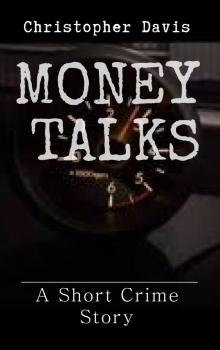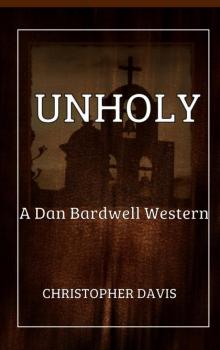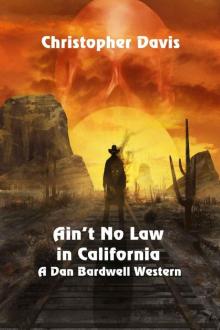- Home
- Christopher Davis
The Conduct of Saints Page 4
The Conduct of Saints Read online
Page 4
“It’s the Allied Military Government, and they are neither invaders nor guests. They are liberators or, if you prefer, occupiers. What you say about rape is nonsense. There have been isolated cases.”
“Do you think so? Perhaps I misheard. His Holiness has said it himself. The Moroccan soldiers are well-known rapists. The fact is that all local cases have been recorded in secret documents, which are to be revealed for the scrutiny of our courts when we are once more truly self-governing.”
“You said fifty of them?”
“I’m understating the number deliberately. If you do not believe that, you would certainly not believe the true number. But think what you like. It’s understood by everyone that you’re a Bolshevik. Even His Holiness says so.”
“But not to you.”
The old bishop had by now made a number of bread balls, and, as he went on about Americans and supreme goodness, wheezing at the effort, he threw the little balls, black with dirt from his fingers, in the direction of the fireplace, where the last of a fire glowed, until Brendan picked up his flask of wine.
“Yes. Excused. I’m at ease with my thoughts. Domine deduc me in iustitia tua. Propter inimicos meos . . . and so on. How you clutch that bottle to your breast! That’s American, isn’t it?—to love the bottle. A hedonist as well as a Red, and I think also you are what is called in modern philosophy an intuitionist. One of Herr Scheler’s disciples. The last’s the greatest fault, given the work you’re asked to do.”
Brendan went out through the barren reception rooms to where a double row of brass mailboxes, each with the name of a resident, some of them departed or dead, were kept in what had been the porter’s room off the principal entrance. There was a telephone there as well for general. The palace was a guest house for Vatican visitors of the second or third rank, of whom two or three were in residence at the moment, their quarters the old family rooms at the front of the building—figures fleetingly seen coming or going, who took their meals elsewhere. There had been talk of accommodating Alessandro Serenelli here for Brendan’s convenience, but he had vetoed the idea, wanting to be near the man only when he chose; and Sergio Paolini, believing Serenelli would be more comfortable with the Franciscans in any case, had found a place for the lay brother at the cloister in the Viminale district, the Superior of which had been one of his seminary professors.
Most of the mailboxes stood open, letters, notices, and circulars spilling from them. Brendan looked in from the doorway, as if he needed permission to enter. He saw lying on the tessellated floor a letter with his mother’s frail writing on its envelope, a bill from a shop of ecclesiastical furnishings next to it. He bent, picked up the bill, left the letter.
◂ 6 ▸
THE HOUSE in which Brendan lived, an extraterritorial Vatican possession, stood less than a quarter of a mile from Vatican City. It had belonged to a papal prince of an old family, a notorious, deliberately indiscreet homosexual, the last of his line, who had presented it to the Church in 1915, after a famous scandal and his permanent expatriation to Majorca. The gift included the palace’s furnishings, the best of which had been sent to the Vatican Museums. All that was left were a few nineteenth-century copies of paintings of saints and the Holy Family, which had hung in the servants’ chambers, and some necessary furniture. Brendan’s room was in the servants’ wing, three floors that rose above the kitchens at the back of the house. Some of these rooms, as well as several of the bedrooms in front, had been requisitioned by Monsignor Hugh O’Flaherty’s Resistance people as safe quarters for Jews and other fugitives until the Nazi retreat from the city the year before.
He tried the first floor bath and saw a pair of naked knees. The stanza on his own floor was occupied as well, and he was bursting. Doors were not locked in this house. You looked for a light under a door to see if the room was in use, knocked, and if no one replied, went in and had a look: Doherty’s room. What’s he up to: some tasty secret?
Standing before the Holy Father with a cigarette behind his ear! Paolini had missed that in his inspection. When he was young, he had gone for his holidays to Morocco, trips paid for by his mother. There you offered a boy a cigarette after a game—Brendan teaching the rudiments of baseball to tour guides and souk runners—and he tucked it behind his ear to smoke after evening prayers. Brendan had learned to do the same, liking the suave gesture, postponing his own cigarette. He remembered a particular boy, Da’ud, with whom he had sat until dawn on one of the rugs scattered across the tiled roof of the house in which he lived with his parents and grandparents—observing the swimming stars, smoking the proscribed but winked-at cigarettes, drinking the mint tea he’d mentioned to Alessandro Serenelli, and learning about the Five Pillars of Islam and the practicability of a sexual friendship free of obligation.
The current in his room, as in the Vatican offices, offered something only a little better than darkness—a ceiling arrangement, one bulb doing the work of three, its filament a pale pulse; a small lamp on the desk; nothing for the table beside the narrow bed. You were not meant to read or write sitting up against your pillow in the narrow bed nor, really, anywhere else in the room after dark. It was forbidden to smoke because of the risk of fire. An armoire held his suits and ecclesiastical robes, a chest his shirts, underwear, and so on, a spare blanket, and toilet articles. There was a prie-dieu—a padded kneeling stool attached to a shelf fixed to the wall beside the window—left from the days of servants who had been more devout than their masters. Above the bed had hung a painting of the crucifixion of a body which appeared to Brendan to have been made of taffy, its brittle canvas torn in a couple of places. He had taken it to the basement of the house the day he moved in twelve years before and put it into an empty coal bin. In its place was a small crucified Christ cast in lead; it had been bought from a street vendor and hung by one of the sisters who could not bear to think of Father Doherty sleeping without protection.
He emptied what remained of the Chianti into his tooth glass, drank it off, lit a Nazionale, and used the wastebasket for the ashes, flicking the cigarette angrily. He thought of his own stupidity before Pius and of Ricci’s ignorance and stupidity at supper, which had spoiled what little pleasure he might have taken in the meal.
He found his breviary and began looking for the quote. Domine deduc me . . . an early psalm. Domine deduc me in iustitia tua. The rest of it about one’s enemies, Brendan being the old bishop’s enemy in this case.
He spoke the bristling Anglo-Saxon word aloud: “Shit.”
He removed collar and cassock, shirt, shoes, and stockings, took up his kit, and, wearing his trousers and the British military sweater with leather gun-patches Alda Calfani had found for him, went barefoot down the hall to the bath, now free, and stopped short of the clouded mirror there, unwilling to look. The thought of the man Koch about to be condemned brought terrors forty years old into the cage of his mind:
An image in a popular monthly magazine. The eleven-year-old Brendan staring at the photo-engraving of a Negro strung up by pale-eyed men in slouch hats and overalls, the men grinning at the camera, hounds turning among their legs—a lynching in Mississippi. Then, less than a month later, in the first week of the new school year: President McKinley shot, the boy hearing his father, a loyal Republican and an emotional man, active in the 1900 campaign, crying behind his bedroom door, and crying again when the President died days later.
The smell of his own illnesses, an abscess in the ear canal lanced: chloroform, decayed blood, lancet and bloody scraps of cotton waste in the enameled dish: white smells, analgesics like ice in the brain, the pain freezing and thawing, freezing again.
And about the same time, seven or eight years old, running away from the house on Catherine Street, joining other neighborhood boys going to see the wounded and dying from the Spanish War off-loaded from cargo ships in the Delaware onto wagons to be carried to nearby Pennsylvania Hospital, or to certain undertaking establishments, or on flat cars to the Broad Street Station for transfer to hometowns in New York, Western Pennsylvania, Ohio.
He ventured a look into the mirror. Not too bad. And he had not done badly that day.
He would have the story out of Serenelli, give him a day or two. If the aging murderer was no liar, all the same he lied. As he had done himself, telling both Sergio Paolini and Koch that Alda Calfani had spoken in support of the imprisoned Fascist.
Love or its counterfeit, one or the other.
In his room again, he stared at the wardrobe with its crazed veneer, singing, “One or the other,” and, as if his will were not involved, opened its door, found the bottle of Spanish gin that smelled like a whore’s perfume, and sipped while he finished undressing, dropped each garment: Sister John would clear up after he left in the morning. Then again he stood still, recalling the letter from his mother on the floor of the mail room: must write a line to the old offender.
His grillo, invisible under the loom of his belly, was not to be touched this night. A final nip, the cork banged home, what was left a promise. One could not help but suppose that even the Son of God would have been drunk from time to time in that short, hard life. As little as a quarter liter of red on an empty stomach, which his must nearly always have been: more than enough to put our Lord on his ear.
That wasn’t what he meant to say.
Naked, with difficulty, tilting sideways, righting like a ship in the waves, he knelt at the prie-dieu under the window, and managed a prayer for Michael’s soul. Michael who had called him Narcissus. He had not mentioned the name in his prayers three times in the more than thirty years since his death, something neglected. “Never mind who this fellow Michael is,” he said to the busybody in the closet of his mind: forget it. He made no effort to rescue the person called Michael from oblivion, a
nd the ghost did not volunteer. He did not think of him, see him, only recommended the name, forever young, to God.
He prayed for the boy to whom he had been giving instruction only twenty months before, and who had been taken to Auschwitz and murdered, he had to suppose, though it was not yet confirmed, with his sisters and his parents, for whom he also prayed. This family too was consigned to a sealed cell in his mind and, except for this husk of prayer, within which they remained dumb, no longer had the means to stir him.
Afterward, he stood at the window of his room and looked at the rain-worn yellow wall across the street illuminated by light from the chamber below his own. He thrust his head out and turned it until the cervical vertebrae pinched in order to see a scrap of sky, a star.
What he remembered and missed (here we go) was the tap-room where he had spent a sensible portion of his time as a student. The bass of comfortable male voices, the surly barman, face barbered raw, starched apron doubled across his flat stomach, garters to keep his cuffs from the suds. There were free lunches then: beet-dyed hard-boiled eggs, ham, rye bread, sausages, and, under the bar, saved for Brendan the student and a few others, smoked salmon and Liederkranz. His stein hung from a hook among those of the favored. The young, broad, guileless, still-handsome face looked back at him through rainbows in the bevels of the mirrors behind all the brown bottles. It had been called Curley’s until 1900, when he was ten. At closing in those days the barkeeps would sing duets about the Troubles and young love. It was owned by Brendan’s father for a few years, renamed the Harp of Tara under new ownership in ’09, followed by various immigrant proprietors, Irish flight, Hoover, Prohibition. Pints, quarts, the fragrant streams going down, friends and classmates crowding at your back, shoving an arm through to the bar—make room, Doc: a goose to encourage him—Doc because he was about to begin medical studies. Saffron ale, brown beer in April and May with Long Island oysters and Maryland softshells, clams casino, Italian sausage, Jewish knishes oily and heavy as pig iron. Beer distended his bladder, sweat greased his brow. A one-bowl bog of a shit-and-ammonia-smelling toilet every half hour—the stinking humanity of it, odds, sods, and drunks, men-only then, the tarts shoved through the open front door into the summer street. What else? Solemn old boozers at corner tables at which no one else dared to sit, or in back rooms, pink ham faces, freckled hands like paving stones among the cards and chips, plotting ways to get Sharps carbines and Lewis guns across to the Brotherhood in the years before the Rising.
Rome needed some wood-framed Northeast or South Philly slum-grade shacks with shingle roofs and tarpaper siding to ease the weight of the marble and travertine. He missed buildings of honest wood; he missed the comfortable roar of comradeship.
But little else. Father dead, mother impossible—priest-ridden (as if he were not himself a priest); baby sister married at forty to one of Mayor Samuel’s gelded councilors. A school acquaintance (Pater his name, Pray? Something unlikelier still?) dead of Bishop Ricci’s tubercle bacillus, the disease going at him like a dog at a rat: Brendan visited him as he lay in a ward, the screen of curtains around, less than a week from his end, breath an oven of decay, invigorated by panic. Why me, he wept, cursing Brendan whom he scarcely knew, who had come along with a few others out of guilt for his own robust health. Why not you? Here—holding back the bedclothes, the gown riding up: you get in, I’ll get out—his manhood asleep on his thigh. Henry Pray was his name. Dead at twenty-six like the poet Keats. Pray for Pray’s soul. Who else? Too numerous to mention. Bit players. Naomi, of course, the medical school pass-around. She flickered briefly, a tam on her black head, scarves flowing, red and white smile. He remembered her seated on a stool at the head of her cadaver, cigarette fuming against the smell, searching the cavity under the sternum as if for meaning, her work-bag of knitting on the bugger’s crotch. She had been a sucker for humanity, and he would watch her and imagine her thinking that only a week before, this flayed object, this envelope, had been pleading for handouts to buy a bottle, had found its final cigarette in the gutter, spent the first hours of its last night asleep on a park bench under the Philadelphia Inquirer, its final hour, dawn pinking the sky, as cold meat. You might pray for people, he had found, without the necessity of summoning them except in a flicker: lights out, heat gone. Such ritual prayer and the ease it brought was the first and final wisdom of any church.
Against precedent and without warning, Michael asserted himself.
The families shared a privy at the bottom of identical back gardens of identical houses—a thin wall between, four holes, two to each. Post-breakfast: Michael on his side, Brendan on his, accustomed to the sounds from each other’s bowels, one attacking logical truth, the other defending it, twelve-year-old voices breaking with rage. Once outside, adjusting their clothing, they were silent, shy, God’s power less than a match-flame in the sun. But what had returned with Michael’s fleeting resurrection was the memory of the joy of shouted certainties.
Brendan’s Famine Irish father had bought empty molasses barrels for a dollar each from a venal watchman at the storage yards on Delaware Avenue, scraped the residue from them, used it to distill whiskey in the basement of his house, sold it out of his cellar door, then sold the clean barrels back to the Seaward-American Line for fifty cents each. Michael’s father, a Russian Jew, opened an emigrant bank in the parlor of his house, sold passports and insurance to his clients, and bought and sold South Philadelphia real estate. By the time the boys were old enough to vote the Bull Moose ticket in 1912, both fathers had become rich and Brendan’s was dead of drink.
He pulled a nightshirt over his head, trying not to think of the prisoner in his cell in the Regina Coeli. Terror must enter Koch like a blade at the very instant sleep was about to be found, jerking him awake. The thought of the man’s fear, walled off all day until now, constricted his breath. He picked up the breviary, opened it at random, found he could not see the words, and closed it.
As he had on previous nights of drunkenness, he dreamed that carabinieri were working him over. Not in the usual vicious way, not in Koch’s way—they were the military’s police, not known for brutality—but with a sort of kindness. Those were the available dream words: “kindness,” followed by “care,” and, threateningly, “affection.” With their mindful kindness (one can bear pain if good is intended, as at the dentist), they managed to wound and arouse him at the same time, one cool hand stroking, another striking hard.
He woke at three with a thirst and an unmanageable erection, went down the hall to the bath, brought himself off, looking into the mirror above the hand basin, empty eyes hooded, jaw slack, the igniting thing, the thing that pushed him over the top, the fact that he could not lock the bathroom door and might be caught in the boyish act. Afterward, he put his head under the tap of the wash basin and drank the iron-tasting water until it ran into his ears. Then he slept for two hours, rose, performed the little office of Our Lady, sat at his desk, noted the dream and the incident of masturbation in his journal, and wrote a letter to his mother, who lived in a twenty-room South Broad Street castle, a rye whiskey called Easy Days having made her a wealthy woman: “I have not had a line from you in such a long time, dear,” he wrote. “I hope it is not because you are unwell.” And so on. He required himself to compose two pages, set down in his Saint Thomas Aquinas Elementary School penmanship, lots of space between the words.

 Money Talks
Money Talks Vicky's Secret
Vicky's Secret Unholy
Unholy Ain't No Law in California
Ain't No Law in California